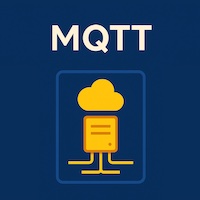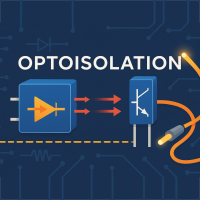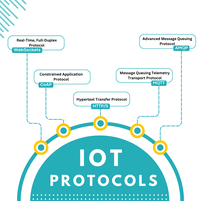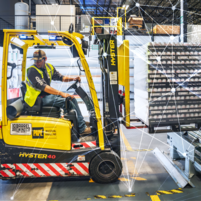IOT applications in business


The Internet of Things (IoT) is no longer mysterious. Our future is being quietly shaped by a technology that has slowly acquired speed. We, humans, are curious and want to lead an easy and connected lifestyle, lowering the amount of work and avoiding the risk of human errors through IoT. We decided to make gadgets bright and take care of things that draw efficiency out of them for this very reason! Internet of Things (IoT) enables data transmission between various devices, including household appliances, software, electronics, and other gadgets. Connected cars, smart homes, smart hospitals, and more innovative industries have all been created by this technology. Things become more accessible and automated when the physical and digital worlds are connected. A smart home allows you to control anything from your thermostat to your oven to your AC system with your smartphone.
What are the advantages of a mobile IoT app for businesses?
- IoT apps increase company prospects by improving business modules and service quality.
- Using sensors to keep track of equipment and preventative maintenance ensures that assets are being used more efficiently.
- IoT apps can easily link to cameras and sensors to avoid bodily harm.
- It improves productivity in the firm by providing staff with training to help them perform more efficiently and eliminate skill mismatches.
- IoT applications can save your company money by improving the business module, asset usage, equipment monitoring, and employee training services.
Listed here are some of the top IoT applications that you may have missed. They're worth a look.
The top IoT applications
Smart homes
Smart homes are one of the best and most practical uses of the Internet of Things, combining ease of use with increased safety and security. The ideal way to use IoT in a smart home is to integrate intelligent utility systems and entertainment into a single system. For example, a smart electricity meter, a set-top box that allows you to record shows from afar, Advanced Locking Systems, Connected Surveillance Systems, and Automatic Illumination Systems all fit within this concept of smart houses. As the Internet of Things (IoT) develops, we may expect many gadgets to become more intelligent, allowing for better home security.
Smart City
Smart cities are expected to be made up of people and their gadgets having connectivity to the internet. We can confidently say that the goal of accomplishing this dream is within reach. Infrastructure requirements and specific critical concerns, including traffic management, waste management, water distribution, and electricity management, are being integrated with connected technologies. People's daily struggles can be alleviated, and their lives are made easier with the help of these innovations.
Self-driven Cars
Self-driving cars have been in the news a lot lately. Google experimented with self-driving vehicles, as did Tesla, and Uber even developed its version, which it eventually abandoned. There are human lives on the line. Therefore technology must have all it needs to improve passenger and roadside safety.
The vehicles use a variety of sensors and embedded technologies linked to the Cloud and the internet to continuously generate data and send it to the Cloud for informed decision-making using Machine Learning. IoT is already being used in some of the most innovative ways, even though it will take some time for governments to update their legislation and rules.
Internet of Things Retail Stores
Check out Amazon Go, the eCommerce giant's concept store, right away if you haven't already. Bridge the gap between online and brick-and-mortar stores by using technology. You can use your Amazon Wallet to make purchases at the retail store instead of bringing cash with you. When you select products from the shelves, it automatically adds them to your shopping cart.
After selecting another item, the previous one is removed from your shopping basket and replaced with the new one. Because there is no cashier to charge your purchases, the concept store is the ideal place to shop. Instead of waiting in line, exit the store after selecting your purchases from the shelves. If this technology succeeds in attracting more customers, it will become the norm shortly.
Farming
The Internet of Things will have the most significant impact on farming. The future of agricultural tools is bright, thanks to the rapid advancements in this field. Water distribution, Drip Irrigation, drones, crop patterns, farm surveillance, and more are being developed. Farmers can produce a higher yield and address the issues better.
Wearables
There is still a lot of interest in wearables in the market. These gadgets can be used for various things, from health and wellbeing to physical training. Jawbone, a wearable company, has received the most money from any IoT firm.
Smart Grids
A smart grid, one of many beneficial IoT examples, is a comprehensive system that uses a wide range of Information Technology resources to reduce electricity waste and cost for both current and new gridlines. Electricity will be more efficient, reliable, and economical in the future, thanks to an intelligent grid.
Industrial Internet
There are sensors, instruments, and other devices connected to energy, management manufacturing, etc., in the Industrial Internet of Things (IIOT). Market analysts like Gartner, Cisco, and others say that the industrial internet has the most significant overall potential despite its lack of popularity.
Telehealth
There hasn't been a full-blown boom in Telehealth/Telemedicine yet. Despite this, the future looks bright for this project. IoT Remote medical diagnosis and evaluation, video consultations with specialists, and the digital transmission of medical imaging are all examples of Telemedicine.
Smart Supply-chain Management
As far as the market is concerned, supply chains have been there for a long time. Transportation-tracking solutions are a good illustration of this. They'll be around long because they're backed by IoT technology.
Traffic Management
The Internet of Things has the potential to revolutionize traffic management in major cities (IoT). By allowing us to use our smartphones as sensors to collect and share data from our cars via apps like Google Maps, the Internet of Things keeps us better informed while also improving traffic monitoring. For each route to a given destination, distance and arrival time data are fed and enhanced by this.
Another use of the Internet of Things is tracking long-term traffic patterns. Peak hours are depicted in this simulation. By providing commuters with information about available alternatives, we may help them avoid traffic and delays.
Water/ Waste Management
Water treatment units are being used in many cities to recycle used water. IoT applications allow you to view how much wastewater is being created, how much is consumed in a particular location, and how waste production changes over time.
Innovative sensor technologies and Internet of Things applications have the potential to solve this problem. How much trash will be generated and when and how it will be processed and analyzed for future planning are only some of the benefits of using an intelligent waste management system in a particular place.
Conclusion:
You can shape the Internet of Things in the way you need to establish new business models and revenue streams, whether you're a growing startup or a large organization. Business automation is increasingly dependent on the Internet of Things (IoT). The Internet of Things (IoT) has the potential to improve productivity, save operating costs, and free up valuable human resources for any business. A custom Internet of Things (IoT) application can easily accomplish this. Using the Internet of Things (IoT) is a great way to link your equipment to the Cloud, collect and protect data, and get real-time insights into your operations.
Explore more
Need any help in IoT?
Need any help in IoT? An Atreyo expert identify the right solution for your needs.
If ready to talk to an Atreyo expert
Interested in IoT products? go to






